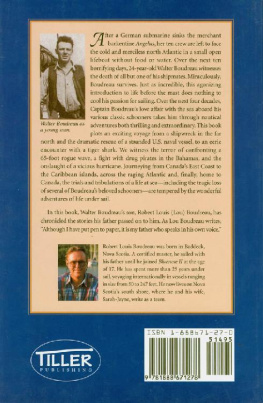This book is dedicated to the memory of my father, Captain Walter Boudreau.
There are a number of people I wish to thank with regard to writing this book. Jeanne Reseigh, Cindy Bradette, and Bob Youden for their unfailing support and honest critique; my sister Janeen Costello, who was a pillar of support along the way. I must thank Dorothy Blythe of Nimbus for taking a chance on a stranded seafarer with an idea and half a manuscript. Most of all though, I owe my lovely wife Sarah-Jayne the greatest debt of gratitude because without her this book could never have been. Through the long nights and the early morning hours she stood the long watch and kept me on my course. The ruthless editor and relentless purveyor of excellence, she is as much a part of this book as I am.
In writing my fathers story, I have tried to hold to the facts, and I believe that in the main, I have succeeded in this. However, the passage of time sometimes clouds the best of memories and I realize that some details might not be remembered by all in the way they are recounted here. I apologize sincerely if I have offended anyone, as that was not my intention.

I WAS BORN ON OCTOBER 14TH, 1918 in Amherst, Nova Scotia to Dr. Francis and Gladys Boudreau. They named me Guy Walter, but I was always known as Walter. My father broke the long line of sea captains from which we came. When he was a young lad, he made the voyage from Nova Scotia to Fajardo, Puerto Rico on his fathers schooner, and was so damned seasick it put him off going to sea forever.
I like the sailing and the romance of the sea, but my stomach is just not up to it, he told me once.
In my youth we lived in Moncton, where I attended St. Bernards Catholic School. The nuns tried to encourage me to believe in things that I could not believe, even at that young age. Miracles, the Garden of Eden, snakes who tried to get you to eat bad apples; it was enough to cloud even the clearest mind.
I was under the misconception that all nuns were called Blessed Virgins (they might well have been) and made the mistake of addressing Sister Mercedes as Blessed Virgin Mercedes one day. This earned me two swollen ears, as well as a few hours worth of acts of contrition, Hail Marys, and Our Fathers.
I ran into trouble with Sister Mercedes on a number of occasions, and so I tried to improve my image by agreeing to appear in the school play, Robin Hood, one year. My mother and father were there in the front row, beaming proudly. I was playing the role of Friar Tuck, and garmented in my brown monks robe and false bald head, I met Maid Marion.
And who are you, kind sir? she asked.
With great pride I stepped forward, and with a voice designed to impress everyone, I replied, I am Trier F.
So, in the third grade, I forfeited forever any thought of an acting career and began thinking of something else.
My father fulfilled the picture of a traditional country doctor of that era. He had a cranky old horse and a sleigh, and an even crankier old Ford car. He would go out on house calls at all hours of the day or night, and in all kinds of weather. It didnt matter if it was snowing, raining, or storming, when the patients in the community needed him, he would go. Often he was paid with buttermilk, cheese, fresh meat, eggs, or the like, instead of cash. We lived frugally in the beginning, but my father did well later on, since apart from the practice he developed in Moncton, he made a small fortune in the stock market.
I suppose I first began to acquire a taste for the sea as a boy in Shediac, where our family spent the summers and kept an elderly thirty-five-foot sloop called the Montrose. She was a white-hulled gaff rigger, with a small cuddy cabin and a large cockpit. We kept her moored at the Shediac Yacht Club and my father employed a retired sea captain by the name of Eben Hebb to look after her.
I looked forward to the summers at the Shediac cottage, when I could sail on the Montrose. Sometimes, I would sit alone in the cockpit after a days sailing and dream she was a tall schooner sailing to Barbados or some other faraway place. Later, during one of the holidays, my father put me in command of the Montrose. I was in heaven, and that summer I sailed my little ship every day. I thought I was quite the captain.
That was until my run-in with the commodore of the yacht club. Returning one day from a sail with my friends, I dropped the anchor in the normal way, putting a stern line onto the dock. The problem was that my stern line was 150 feet long and when the commodore, Hal Weldon, cruised in later that evening with his new motor boat, he got his propeller tangled in the line. This upset him greatly and in his impatience he throttled the engine with the result that the shaft and propeller of his new boat got bent out of shape, and so did he.
Two days later, a very tall mountie with huge polished boots came to our door and asked for the captain of the Montrose. I was put forward as that person and for the first and only time in my life, I was relieved of command. My father had to pay for my mistake and it was a long time before I was able to forget that little episode.
My father had a reputation for being a rather tight-fisted gentleman and he quarrelled regularly with Captain Hebb over the maintenance costs of the sloop. On one occasion, just before the beginning of the summer yachting season, Hebb informed the doctor that we would be needing a new set of sails for the sloop, as the old ones were just too rotten to repair. The cost would be thirty-five dollars, twenty for the main and fifteen for the jib. My poor father nearly had a fit. His left foot used to twitch nervously when he was upset, and now it was jumping around as though there was a fire beneath the sole.
You are a scoundrel and a rogue, sir he announced, and I will not pay that amount.
Poor Captain Hebb ended up sewing them himself and without a word of complaint. Later that summer, however, there was an accident aboard the Montrose, which highlighted how important it was to keep a boat well maintained.
We were out for a family sail one Sunday. There was the doctor, my mother Gladys, Aunt Gert, Captain Hebb, and myself. It was a brisk sunny day and the Montrose was making a fine time of it, reaching past Shediac Island with her rail down. The ladies held onto their bonnets tightly, while my father steered. Whenever there was a good puff of wind, the sloop heeled way over on her side, my mother would quickly offer up a prayer while bracing her feet and glaring at the helmsman. Captain Hebb and I tended the running backstays and the jib sheets whenever we tacked, and all seemed to be just hunky-dory until towards noon, when the wind began to get gusty.
Suddenly, there was a loud report like a gunshot on the sloop. The crew of the Montrose looked up in horror as the whole rig came crashing down. One of the wire stays, which Captain Hebb had so pleaded with my father to have changed, had parted under the strain and the mast broke off at the deck.
Oh my God, the post broke! cried Aunt Gert.
Francis, I will never forgive you for this, my mother admonished her husband.
As Captain Hebb and I cleared the wreckage, the rosaries that Aunt Gert and Gladys always seemed to have handy came out and the Hail Marys poured forth. No amount of prayer, however, was going to fix the mast and eventually a small motor boat came out from the yacht club and towed us in.
As a result of this incident, my mother absolutely refused to go near the




![Greek islands [2018]](/uploads/posts/book/209249/thumbs/greek-islands-2018.jpg)





